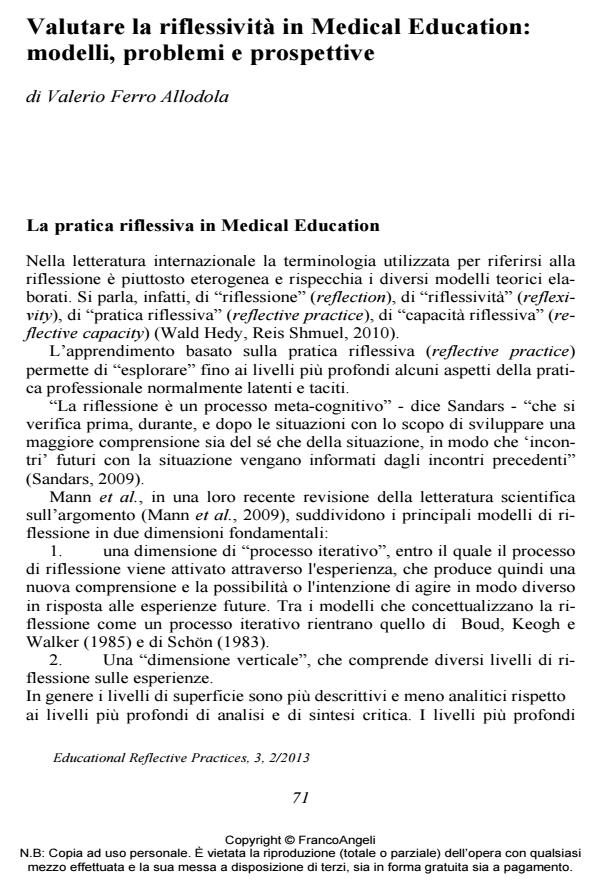Valutare la riflessività in Medical Education: modelli, problemi e prospettive
Titolo Rivista EDUCATIONAL REFLECTIVE PRACTICES
Autori/Curatori Valerio Ferro Allodola
Anno di pubblicazione 2014 Fascicolo 2013/2
Lingua Italiano Numero pagine 18 P. 71-88 Dimensione file 595 KB
DOI 10.3280/ERP2013-002005
Il DOI è il codice a barre della proprietà intellettuale: per saperne di più
clicca qui
Qui sotto puoi vedere in anteprima la prima pagina di questo articolo.
Se questo articolo ti interessa, lo puoi acquistare (e scaricare in formato pdf) seguendo le facili indicazioni per acquistare il download credit. Acquista Download Credits per scaricare questo Articolo in formato PDF

FrancoAngeli è membro della Publishers International Linking Association, Inc (PILA), associazione indipendente e non profit per facilitare (attraverso i servizi tecnologici implementati da CrossRef.org) l’accesso degli studiosi ai contenuti digitali nelle pubblicazioni professionali e scientifiche.
The paper discusses the evaluation models of reflexivity in Medical Education. Starting from an analysis of the models currently available in the literature, the author highlights the potentials, limitations and prospects for future research in this specific field . The focus on this research project comes from CIN@MED PROJECT - Learning Path to a reflexive knowledge in the medical profession through the use of the film - which is set up as a compulsory vocational activities aimed at students of the second year of Degree Course in Medicine and Surgery, University of Florence. The experiment was initiated in the A .Y. 2009/2010. CIN @ MED is a path that is part of the regular university education in the Faculty of Medicine and Surgery and it is based on the vision of some movies suitably selected, according to the subject to be discussed, followed by a debate in the presence of a discussant, specialized in the subject dealt with. All this was accompanied by the construction of knowledge checks through questionnaires (database), blogs and wiki, which produced a network of teachers and students involved in the project. It has also become a shared reflexive platform. The project is curated by Patrizia de Mennato, Andreas R. Formiconi, Amedeo Amedei , Stefano Beccastrini, Carlo Orefice e Valerio Ferro Allodola, within the activities of the Laboratory of Medical Education, University of Florence (Direction: Patrizia de Mennato).
Valerio Ferro Allodola, Valutare la riflessività in Medical Education: modelli, problemi e prospettive in "EDUCATIONAL REFLECTIVE PRACTICES" 2/2013, pp 71-88, DOI: 10.3280/ERP2013-002005